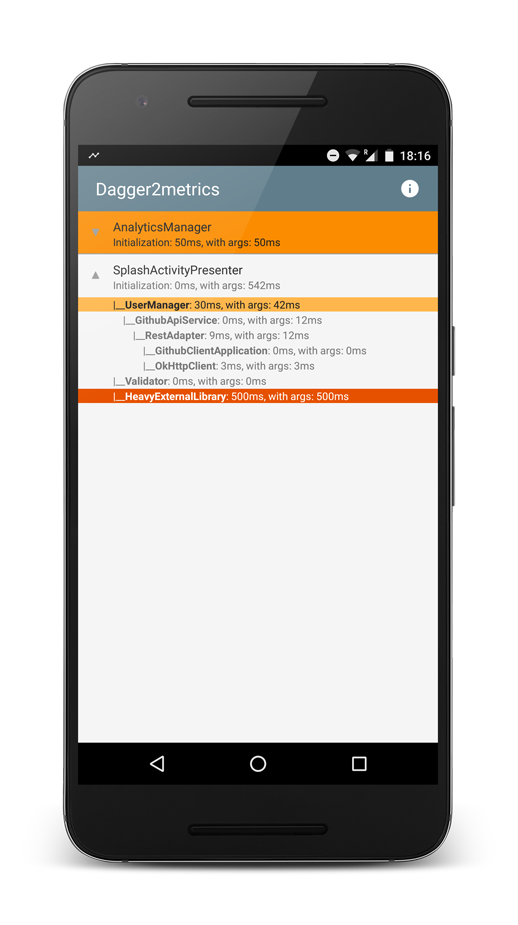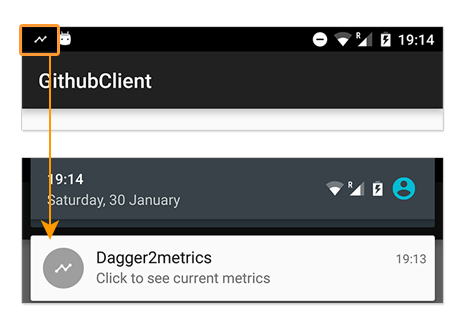Performance metrics library for Dagger 2 initialization process.
If you use Dagger 2 for dependency injection in your Android app you probably know that it's super optimized and non-reflection piece of code served by great engineers from Google (and formerly from Square).
Even with all those optimizations and fully generated non-dynamic code, still there are potential performance issues hidden in our code and all 3rd parties injected via Dagger 2.
The problem with performance is that it often decreases slowly so in day-by-day development it's hard to notice that our app (or Activity or any other view) launches 50ms longer. And another 150ms longer, and another 100ms...
With Dagger2Metrics you will be able to see how much time was needed to initialize all requested dependencies (and dependencies of those dependencies).
In your build.gradle:
buildscript {
repositories {
jcenter()
}
dependencies {
classpath 'com.frogermcs.dagger2metrics:dagger2metrics-plugin:0.2'
}
}
apply plugin: 'com.android.application'
apply plugin: 'com.frogermcs.dagger2metrics'In your Application class:
public class ExampleApplication extends Application {
@Override
public void onCreate() {
super.onCreate();
//Use it only in debug builds
if (BuildConfig.DEBUG) {
Dagger2Metrics.enableCapturing(this);
}
}
}And that's all. In your app you will see notification which opens simple summary of all finished initializations.
Dagger2Metrics captures all initializations from both - @Module -> @Provides annotated methods and @Inject annotated constructors.
In summary you will see the most-top injected dependencies with trees of their dependencies. Each of dependency shows how much time was needed to provide this object to Dagger 2 object graph (construction time itself and overall time with all dependencies).
Metric trees don't show dependencies which are already provided to Dagger's graph, so only those constructed from scratch will be visible. Mainly because of readability and from a simple reason - we don't want to measure Dagger 2 performance which in most cases won't be an issue.
Instead we should be sure that our code provides requested dependencies as fast as it's possible.
Dagger2Metrics has three default levels of warnings:
Dagger2Metrics.WARNING_1_LIMIT_MILLIS // 30ms
Dagger2Metrics.WARNING_2_LIMIT_MILLIS // 50ms
Dagger2Metrics.WARNING_3_LIMIT_MILLIS // 100msYou can adjust them to your needs.
You can check GithubClient project - example Android app which shows how to use Dagger 2. Most recent version uses Dagger2Metrics for measuring construction times.
If you're just starting with Dagger 2, here is the list of resources which can help you with it:
GithubClient - example of Github API client implemented on top of Dagger 2 DI framework.
Blog posts:
- Dagger 1 to 2 migration process
- Introdution to Dependency Injection
- Dagger 2 API
- Dagger 2 - custom scopes
- Dagger 2 - graph creation performance
Copyright 2016 Miroslaw Stanek
Licensed under the Apache License, Version 2.0 (the "License");
you may not use this file except in compliance with the License.
You may obtain a copy of the License at
http://www.apache.org/licenses/LICENSE-2.0
Unless required by applicable law or agreed to in writing, software
distributed under the License is distributed on an "AS IS" BASIS,
WITHOUT WARRANTIES OR CONDITIONS OF ANY KIND, either express or implied.
See the License for the specific language governing permissions and
limitations under the License.

